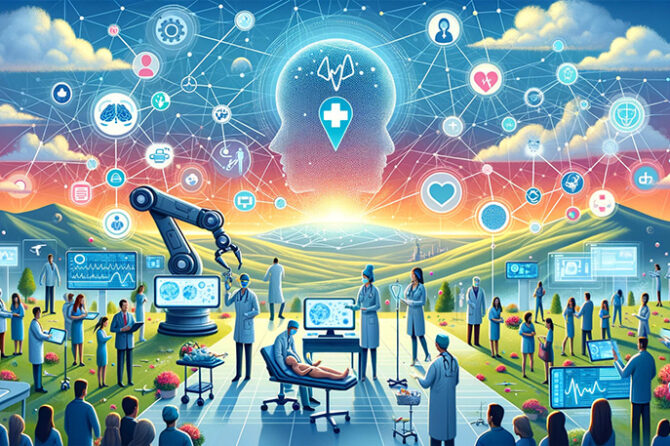
A comprehensive discussion by Carey Beth Goldberg and colleagues in NEJM AI 2024 on “To Do No Harm — and the Most Good — with AI in Health Care” navigates through the promising yet cautious landscape of Artificial Intelligence in Healthcare (AIH), reflecting on its potentials, challenges, and ethical considerations, as derived from the RAISE conference organized by the Department of Biomedical Informatics at Harvard Medical School.
Introduction to AI in Healthcare
The integration of AI in healthcare offers unprecedented opportunities to enhance patient care, streamline processes, and address the limitations of current healthcare practices. Through real-life scenarios, Goldberg et al. highlight the transformative potential of AIH, ranging from correcting misdiagnoses to enhancing mental health support in remote areas. These instances underscore the ethical imperative of leveraging AIH to directly benefit patients and minimize harm, a sentiment echoed throughout the RAISE conference.
The Ethical Imperative of AIH
The push for AIH adoption is driven by the urgent need to overcome modern medicine’s complexities and the limitations of human capacity. The authors advocate for a patient-centric approach to AIH, emphasizing the ethical obligation to ensure its benefits reach all societal strata while mitigating possible harms. This stance is pivotal in framing AIH not just as a technological advancement but as a moral compass guiding healthcare towards more equitable, efficient, and effective practices.
Balancing Potential with Prudence
The enthusiasm for AIH’s potential is tempered by cautionary tales from past technological implementations in healthcare, such as electronic medical records. Goldberg et al. discuss the regulatory and privacy challenges that accompany AIH, advocating for responsible deployment that prioritizes patient welfare and trust. The contrast between the optimism for AIH in the U.S. and the regulatory focus on risks in Europe underscores the global debate on balancing innovation with safeguarding patient rights and data privacy.
Key Insights and Actions from the RAISE Conference
The RAISE conference crystallized several actionable insights for advancing AIH responsibly:
- AIH adoption should be accelerated, focusing on tangible benefits to healthcare delivery and patient outcomes.
- Ethical guidelines and codes of conduct must guide AIH development and application, emphasizing equity and vigilance against errors.
- AI should complement, not replace, traditional healthcare roles, enhancing rather than disrupting the clinician-patient relationship.
- Patient data usage for AI training requires ethical consideration, favouring opt-out models while ensuring robust privacy protections.
Moving Forward with AIH
Goldberg and colleagues call for a collective effort involving healthcare leaders, policymakers, and the public to embrace AIH’s potential responsibly. They highlight the importance of establishing clear guidelines for AIH implementation, fostering transparency in AI development, and ensuring AIH tools are accessible and equitable. The authors underscore the ongoing need for dialogue and adaptation as AIH evolves, emphasizing that the journey toward integrating AI in healthcare is as much about continuous learning and ethical consideration as it is about technological advancement.
Windup
The insights from “To Do No Harm — and the Most Good — with AI in Health Care” offer a nuanced perspective on the intersection of artificial intelligence and healthcare. Carey Beth Goldberg and colleagues provide a thoughtful analysis of AIH’s potential to revolutionize healthcare, balanced with a deep understanding of the ethical, regulatory, and practical challenges that accompany such a paradigm shift. As AI continues to advance, the principles and discussions from the RAISE conference and the contributions of Goldberg et al. will undoubtedly serve as foundational elements in navigating the future of AI in healthcare.
Prof. Dr. Prahlada N. B
15 March 2024
Chitradurga.
Reference:
To Do No Harm — and the Most Good — with AI in Health Care.
Leave a reply
















Prahlad Sir 🌹,
Goldenberg's
Golden words on AI❗
Giving us an overview of
Good practices, & also
Ethical considerations
while
Embarking on a path of
midline,
Especially to improve…
Overall healthcare
Outcomes, within & also
Outside cities ……
In summary, while AI presents tremendous opportunities for advancing healthcare, it is imperative to integrate ethical considerations into the development and deployment of AI technologies. By prioritizing patient well-being, privacy, equity, and transparency, the healthcare sector can harness the potential of AI in a responsible and ethical manner to improve patient care and outcomes.
Reply